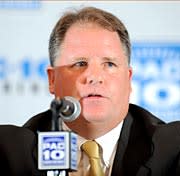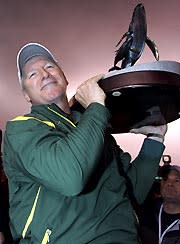A Chip off the Granite block

Former Oregon offensive coordinator Chip Kelly is taking over as head coach after Mike Bellotti stepped down to become athletic director.
(Kirby Lee/US PRESSWIRE)
LOS ANGELES – As breeding grounds for college football coaches go, New Hampshire comes to mind no later than, oh, after 49 other states. This is one of the reasons to wonder how in the heck Chip Kelly – a native of the Granite State and longtime resident of the game's netherworld – has become the head coach at the University of Oregon.
Two years ago, Mike Bellotti plucked Kelly out of Durham, N.H., and hired him as Oregon's offensive coordinator. Bellotti stepped aside as head coach after last season, became the athletic director and made sure that Kelly was his successor.
Bellotti's move was bold for several reasons:
• Kelly has no head coaching experience, not even at the high school level.
• Kelly had never coached in college football's top division before he arrived at Oregon.
• Kelly had never been the frontman for a press conference until Thursday at Pac-10 Media Day.
The 45-year-old freshman coach sat down next to Oregon cornerback Walter Thurmond, looked at the assembled reporters and said "First off, I want everybody to know that Walter and I voted for Tim Tebow for first-team All-SEC quarterback."
So much for deference. Take that Steve Spurrier.
It was Spurrier who recently left Tebow off the all-SEC ballot – by mistake, Spurrier insisted – denying Tebow a unanimous selection. Kelly, meanwhile, could care less about ballots or whether anybody is giving him a vote of confidence.
"Do I think I can do the job?" he said. "Absolutely."
His joke about Spurrier's snafu went over well. But Oregon fans might think the real joke is that Bellotti campaigned for a guy who, by traditional standards, has questionable credentials.

Bellotti believes that Kelly is ready to make the move to head coach.
(AP Photo/Chris Park, File)
"I'm sure they're saying that right now," said Bellotti, who compiled a 116-55 record in 14 years as the Ducks' head coach. "They may be saying that in the future. …
"I've been evaluating my replacement for the last 20 years basically, looking across the nation and at people on our staff and getting a sense of who I thought would be the best person."
Everyone knows that football coaches come from Woody Hayes country in Ohio, Bear Bryant country in Alabama and Joe Paterno country in Pennsylvania. But New Hampshire?
"He was kind of like a secret," said Sean McDonnell, the head coach at the University of New Hampshire, where Kelly was an assistant starting in 1994. "Somebody just needed to give him a chance."
If success is based on X's and O's, Kelly can start drafting his acceptance speech for the College Football Hall of Fame.
Under Kelly, Oregon broke the school's scoring record in each of the past two seasons. Just how good is his spread option offense?
"I didn't see anybody stop it," said Arizona State coach Dennis Erickson, a two-time national champion whose team suffered a 54-20 loss to Oregon last season.
What Erickson and the Pac-10's other coaches did see was Kelly work virtual miracles with Oregon's quarterbacks. In each of the past two seasons, Oregon began the year with an unheralded QB who had been buried on the depth chart. In 2007, Kelly helped transform underachieving Dennis Dixon into the Heisman Trophy frontrunner before Dixon suffered a season-ending knee injury. In 2008, Jeremiah Masoli emerged as a strong starter.
Kelly once played quarterback himself, so well that former UNH coach Bill Bowes clearly remembers when he first saw Kelly. There's not a lot to scout in New Hampshire as fewer than 40 high schools field teams.
"He wasn't very big, and he didn't possess the outstanding speed that you'd like to see with a guy of his limited height," Bowes said. "… We thought he was a preferred walk-on. He wasn't a scholarship kid."
Bowes was so impressed by Kelly's quarterback skills, he moved him to defensive back. Kelly spent four years at UNH without starting a game. But from the sideline and in the film room, he studied as if pursuing a PhD in football.
Four years later, his coaching career began as auspiciously as his college playing career ended.
The Kelly file
After four years as a high school assistant coach in New Hampshire, Chip Kelly began his trek to becoming the head coach at the University of Oregon.
Year | School | Coaching position |
|---|---|---|
1990 | Columbia | Defensive backs, ST |
1991 | Columbia | Linebackers |
1992 | New Hampshire | Running backs |
1993 | Johns Hopkins | Defensive coordinator |
1994-96 | New Hampshire | Running backs |
1997-98 | New Hampshire | Offensive line |
1999-2006 | New Hampshire | Offensive coordinator |
2007-08 | Oregon | Offensive coordinator |
2009 | Oregon | Head coach |
Kelly spent four years as an assistant coach at Manchester (N.H.) Central High School before cracking the college ranks. Two years at Columbia. A year at UNH. A year at Johns Hopkins. Then 13 more years at UNH.
But anyone trying to make sense of Kelly's sudden rise to the big time should look beyond the resume. It's worth the time to check his odometer and frequent flier miles.
During his tenure at UNH, he traveled extensively, visiting with the top offensive minds in football, gathering ideas. He got a chance to employ what he had learned in 1999, the year McDonnell succeeded Bowes and named Kelly offensive coordinator.
"You name it, we ran it," said Ryan Day, the quarterback during Kelly's first year as offensive boss.
The veer. The wing T. The Power I. The spread offense. And then there was the game at Dartmouth, then celebrating its 100th year of football. Kelly turned back the clock almost 100 years.
His offense opened the game in a single-wing, a formation last used with regularity during the days of the leather helmets.
"Guys are going every which direction, and the quarterback is using those old ball handling moves, faking passes one way and putting the ball behind the back," Day said. "Week in and week out, we just had a blast."
No one knew what to expect. New Hampshire passed the ball six times and beat Massachusetts. The next week, UNH threw 65 times and in double overtime beat Delaware, then the defending Division I-AA champions.
It was another victory worthy of a rousing celebration cut short on the plane ride home.
"I'm enjoying the win, we're all joking around, and he'd say, 'Hey, Rick, come check this out. This is going to be a big play next week based on their defense,'" said Ricky Santos, another quarterback. "He'd be on his computer, and his mind was going a million miles a minute. We were all excited and he'd be thinking about the next opponent."
On Mondays, Kelly distributed comprehensive scouting reports, so detailed some players were tempted to gloss over certain pages – at their own risk. In those scouting reports, Kelly inserted paragraphs that read along the lines of, "When you get this, see coach Kelly and say the word elephant."
Santos was one of those who listened closely because he learned the value of Kelly's wisdom. As a redshirt freshman, Santos entered preseason drills battling for the third-string job. One quarterback transferred, another sprained his ankle and before halftime of the season opener, the All-American starter tore his ACL.
In came Santos. In the second half, with Kelly adapting the offense, Santos competed 10 of 11 passes and UNH upset Delaware.
Two years later, Santos won the Walter Payton Award, given annually to the most outstanding offensive player in the Football Championship Subdivision.
By then, at least on the East Coast, Kelly began to catch the eye of other coaches. But he turned down offers to become a quality control coach with the New York Giants, quarterback coach at Connecticut and an assistant at Temple.
"I always was amazed that he stayed," McConnell said. "We had long talks, and he was always in control here. He ran the offense. He got to call all the plays. … That meant a lot to him."
He also got to continue the offseason junkets. Kelly made regular stops in California, where he managed to persuade prospects to abandon sunshine for the snow in Durham. He continued to scour the country for innovative ideas for his offense, and the destinations included Penn State, Boston College, Clemson, Auburn, Georgia Tech, Illinois, Michigan State, Syracuse and Northwestern.
"There are millions of them," he said Thursday.
Then there was Oregon.
In 2005 he headed for Eugene and watched Bellotti's staff install the spread offense. The tie: Gary Crowton, who coached at New Hampshire with Kelly from 1988-91. Kelly visited the following year too, and Bellotti said his staff exchanged ideas with Kelly. When Crowton left Oregon for LSU, Bellotti needed a new offensive coordinator.
Kelly was one of three candidates. The other two declined to interview. Kelly got the job.
Kelly said he didn't take the job because he saw a chance to become a head coach, but because he wanted to test his offense against the likes of USC's Pete Carroll and Erickson.
Kelly helped take the Oregon offense to unprecedented heights. The Ducks have scored 50 or more points 10 times over the past two seasons. What impressed Bellotti more than the offense's output was the way Kelly adjusted when the Ducks lost key players to injury.
"Certain people are masters of their own system," Bellotti said. "But Chip's ability to create and integrate other ideas is [unsurpassed]."
His offensive acumen was only one reason Kelly won the head coaching position, according to Bellotti.
"He had demonstrated the kind of commitment, creativity and persuasiveness that I think will suit him very well as a head coach," Bellotti said. "He was one of our best recruiters. And his schemes are innovative and creative and create a lot of problems for opponents."
Told that some people consider his offense futuristic, Kelly demurred. He mentioned isosceles triangles and other geometric principles.
"It dates back to the Pythagorean Theorem," he said. "It's actually ancient history."
Seeing the quizzical looks on the faces of reporters, Kelly broke it down more simply. It's basic math. Count the number of players a defense lines up in the box, he said. If there are too many defenders to block, pass the ball. If there are too few defenders to stop the run, run the ball.
"It's really that simple," he said. "We all just try to make it look fancy."
Already, other coaches are trying to copy elements of Kelly's offense. Others currently toiling in the netherworld of college football might try to follow his unconventional path.
"Yeah," he said, "unless I fall flat on my face."
